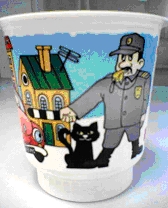|

|
They are creatures of urban legend and the target of endless jokes in this exhaust-filled, car-clogged megalopolis. Burly men in baggy uniforms, Moscow 's traffic inspectors are lampooned - for creating monstrous traffic jams, for their readiness to take a bribe - and blamed for everything from bad roads to terrorist attacks.
Such fear do they strike into drivers that a life-size mock-up of a traffic officer in a city south of Moscow was sufficient to cut violations significantly. But despite the outsize reputation, says officer Sergei Moskalyov, "You can't make traffic inspectors out to be from another world."Perched behind the wheel of his blue-and-white Lada with a rattling door ("It's a domestic car"), in his warm inspector's jacket, Moskalyov is king of the road.
|
An eight-year veteran of the State Auto Inspection force, familiarly known by its acronym as the GAI (pronounced gah-EE), Moskalyov says he tries to be philosophical about the criticism. "Not everybody will love you," he said during a recent tour of his beat along the Garden Ring, the multilane inner beltway that runs for 15 kilometers, or nine miles, around the city center.
Moskalyov's route is anything but a garden. The traffic at best moves at about 20 kilometers an hour in daytime, slows to a crawl during rush hour, and has been known to bottleneck even at midnight. The exhaust could kill anything green.
Many drivers gripe that the jams are made worse by the traffic inspectors, who stand at every major intersection and many an unexpected corner. Common wisdom is that they are after drivers' rubles in the form of fines - or bribes paid to avoid the fines.
Moskalyov retorts that Russia 's low fines for minor violations - some of less than $2 - encourage a cavalier attitude.
"Show me an inspector who asks for money," said Moskalyov, who agreed to be interviewed only after being authorized to speak with a reporter by the GAI's propaganda department. However, he allowed, "It's another story when drivers offer money."
Indeed, in Russia , petty corruption is a two-way street, with many drivers admitting they prefer to pay a bribe of less than $10 than wait for a traffic inspector to fill out the necessary form for a tiny fine that must be paid at Sberbank, the state bank, known for long lines.
The ease of such bribery has even been blamed for attacks by Chechen rebels: Terrorists on their way to a hostage-taking in the southern Russian city of Budyonnovsk in 1995, for example, were confident that they would be able to bribe the traffic police.
According to police statistics, nearly 34,000 people died in road traffic accidents in Russia last year. In Moscow , 213 people died in car accidents in the first three months of 2006, official statistics show.
On his recent shift, Moskalyov stopped for several minor accidents. Two were on bridges over the Moscow River , one involving a pink truck covered in gray slush, transporting a line of children's cosmetics called Princess.
Still shaken by an accident the previous day in which a 5-year-old child was injured, he said: "You can't get used to this. You can't get used to seeing the victims and lots of blood."
Moskalyov's career stems from what he describes as a love for the road. When he was 20, just before the Soviet Union fell apart, he became a conductor on international train routes. "It was romantic, I wanted to travel," he said. Once the romance faded, he enrolled in college and decided to join the GAI.
If Moskalyov seems like a Potemkin Gaishnik or a philosopher on wheels, his home life could be a sitcom-perfect version of post-Soviet middle-class Moscow , featuring a parakeet, an adorable dog, a cat named Diva, and teenage daughters, Anya and Olya, who haunt the nearby Mega Mall on weekends. Moskalyov makes occasional stops at the Ikea there. He likes to relax by going to the sauna with friends.
His wife, Nadezhda, a petite blonde, is an interior designer. Being the wife of a Gaishnik, they both admit, is hard, but mobile phones have eased the burden. "I call to see if he's all right," she said. "He says he's fine, and I'm happy."
Moskalyov said the family's combined monthly income of 72,000 rubles, or about $2,600, covers annual vacations, partly subsidized by the GAI, which pays plane fare for him and his wife. Last year, the family traveled to Tunisia , which like Turkey and Egypt has become an affordable package-tour destination for many Muscovites. Moskalyov loved the mosaics in Carthage - he is glad his daughters had something on their minds other than the mall - and was fascinated to learn that female drivers there are not stopped after dark (to protect male traffic police from temptation).
This, he said, proves his point about traffic inspectors. Whatever superhuman qualities they may be imbued with by legend, he said, in fact, "We are all people - like everyone else."
|